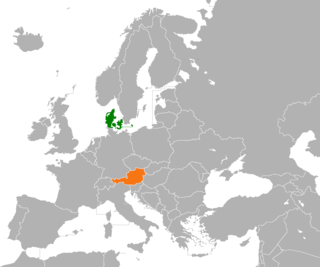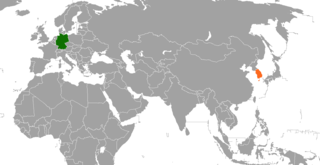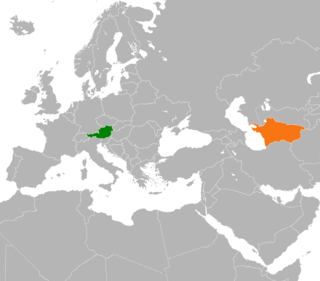 | |
Austria | South Korea |
|---|---|
Foreign relations exist between Austria and South Korea. Diplomatic relations between the two countries were established on May 22, 1963.
 | |
Austria | South Korea |
|---|---|
Foreign relations exist between Austria and South Korea. Diplomatic relations between the two countries were established on May 22, 1963.
The first description of Korea by Austrians was by the Jesuit missionary Martino Martini (Italian but then part of the Holy Roman Empire), who introduced Korea in the Novus Atlas Sinensis in 1655 while doing missionary activities in China. The first Austrian Korean contact that is recorded in history happened in 1886, when the Austro Hungarian ship SMS Nautilus (1873) docked at the Korean harbors of Komundo, Pusan and wonsan. [1] Before 1914, total of 10 Austrian empire ships visited korea. In 1894, Austrian American adventurer Ernst von Hesse-Wartegg traveled around Korea, and published a book about his travels, which was influential among German travel literature for 20 years. The first diplomatic treaty between Korea and Austria happened in 1892, with the Austria–Korea Treaty of 1892. [2] In 1893, SMS Kaiserin Elisabeth, the ship which had guests such as Franz Ferdinand aboard (Franz, however, landed in Japan before the ship's arrival in Korea and never visited), arrived in Incheon (Chemulpo), to give the ratification document of the 1892 treaty by Franz Joseph I of Austria to Gojong of Korea, and Gojong sent back a royal armour as a gift, now exhibited in the Kunsthistorisches Museum. [3] [4] [5]
Austria has an embassy in Seoul and an honorary consulate in Busan. South Korea has an embassy in Vienna. The Austrian embassy in Seoul is located in the same building as the Australian embassy, often leading to misdelivered mail and confused visitors. [6]
In 2007, South Korea was Austria's fourth-largest non-European Union trading partner. Two way trade was valued at about US$1.8 billion that year. [6]
In April 2007, the President of Austria Heinz Fischer paid a state visit to South Korea. It was the first ever state visit of an Austrian President to the republic. [7]

South Korea maintains diplomatic relations with 191 countries. The country has also been a member of the United Nations since 1991, when it became a member state at the same time as North Korea. South Korea has also hosted major international events such as the 1988 Summer Olympics and 2002 World Cup Football Tournament and the 2011 IAAF World Championships Daegu South Korea. Furthermore, South Korea had hosted the 2018 Winter Olympics which took place in Pyeongchang from 9 to 25 February.

The Japan–Korea Treaty of 1905, also known as the Eulsa Treaty, Eulsa Unwilling Treaty or Japan–Korea Protectorate Treaty, was made between the Empire of Japan and the Korean Empire in 1905. Negotiations were concluded on November 17, 1905. The treaty deprived Korea of its diplomatic sovereignty and made Korea a protectorate of Imperial Japan. It resulted from Imperial Japan's victory in the Russo-Japanese War in 1905.
Germans in Korea have a long history, though they have never formed a significant population.

The U.S. Embassy in Austria is located in Vienna. Since 2023, the United States Ambassador to Austria is Victoria Reggie Kennedy. The Austrian Embassy in the U.S. is located in Washington, D.C. Currently, the position of the Austrian Ambassador to the United States is Petra Schneebauer.

Bilateral foreign relations exist between Austria and Malaysia. Austria has an embassy in Kuala Lumpur, and Malaysia has an embassy in Vienna.

Foreign relations exist between Austria and Japan. Both countries established diplomatic relations in 1869, that lasted until severed in 1914 due to the First World War. Relations were reestablished following the war. Austria has an embassy in Tokyo and four honorary consulates: in Hiroshima, Nagoya, Osaka and Sapporo. Japan has an embassy in Vienna and an honorary consulate in Salzburg.

The nations of Austria and Mexico established diplomatic relations in 1842. Relations were strengthened in 1864 when Archduke Maximilian of Austria became Emperor of Mexico, however, after his execution, diplomatic relations were severed until 1901. Diplomatic relations were once again disrupted in 1938 during the Anschluss and relations were fully restored after World War II.

Foreign relations exist between Austria and Saudi Arabia. Both countries had diplomatic contact since 7 July 1880, with the opening of an Austrian consulate in Jeddah. Official and direct diplomatic relations were established on 10 September 1957. Today, Austria has an embassy in Riyadh and Saudi Arabia has an embassy in Vienna.

Diplomatic relations exist between the Republic of Austria and the Republic of Colombia. Both nations are members of the OECD and the United Nations.

The nations of Mexico and the Republic of Korea established diplomatic relations in 1962. Both nations are members of the Asia-Pacific Economic Cooperation, Forum of East Asia–Latin America Cooperation, G-20 major economies, Organisation for Economic Co-operation and Development and the United Nations.

The 1955 Austrian State Treaty ended the four-power occupation and recognized Austria as an independent and sovereign state. In October 1955, the Federal Assembly passed a constitutional law in which "Austria declares of her own free will her perpetual neutrality." The second section of this law stated that "in all future times Austria will not join any military alliances and will not permit the establishment of any foreign military bases on her territory." Since then, Austria has shaped its foreign policy on the basis of neutrality.

Austria–Canada relations refers to the diplomatic relations between the Republic of Austria and Canada, the importance of which centres on the history of Austrian migration to Canada. Approximately 200,000 Canadians have Austrian ancestry. Both nations are members of the OECD and the United Nations.

Foreign relations exist between Austria and Denmark. Austria has an embassy in Copenhagen and Denmark has an embassy in Vienna. Both countries are full members of the Council of Europe, of the Organisation for Economic Co-operation and Development, and of the European Union. Diplomatic relations were established on 19 December 1925.

Foreign relations exist between Austria and Vietnam. Austria has an embassy in Hanoi. Vietnam has an embassy in Vienna. Diplomatic relations were established in 1972.

Austria–India relations or Indo–Austrian relations are the international relations that exist between Austria and India.

Germany–South Korea relations were established in the 1950s and play a vital role in the foreign policy of both countries today.

Austria and Indonesia established diplomatic relations on 20 November 1954. Austria recognizes Indonesia as a stable and reliable partner, and both countries enjoy excellent relations. The two nations have agreed to expand relations in business, trade and investment, tourism, culture, environment and green technology. Austria has an embassy in Jakarta and honorary consulates in Yogyakarta, Bandung and Surabaya, while Indonesia has an embassy in Vienna that is also accredited to Slovenia.

Bilateral relations exist between Austria and Turkmenistan. Turkmenistan maintains an embassy in Vienna, where the current Ambassador of Turkmenistan to Austria is Mr. Nurberdiyev Sylapberdi Ashyrgeldiyevich. Austria has an embassy with residence in Astana (Kazakhstan) where the current Ambassador of Austria to Kazakhstan and Turkmenistan, Tajikistan, Kyrgyzstan is Mr. Wolfgang Banyai

Serbia–South Korea relations are foreign relations between Serbia and South Korea. Both nations established diplomatic relations in 1989. Serbia has an embassy in Seoul and South Korea has one in Belgrade.

Diplomatic relations exist between the Republic of Austria and the Federative Republic of Brazil. Both nations are members of the United Nations.